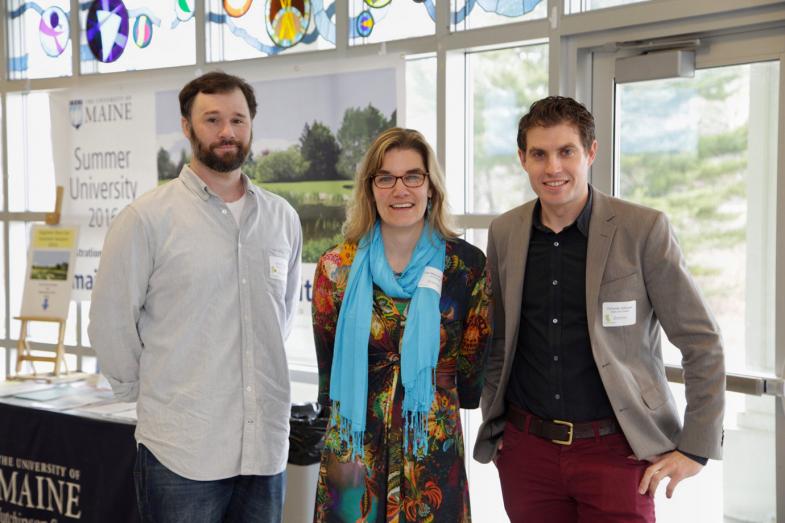
Michael O'Neil / Island Institute
Archipelago Director Lisa Mossel Vietze with presenters Jared Cowan and Orlando Johnson
The Archipelago Artists and Makers Conference was reimagined this year to grow beyond an invitation-only event, and it expanded well beyond our expectations to include over 130 artiststhat attended from all four corners of the state - Kennebunk to Houlton and Bethel to Machiasport. Maine has always been an inspiration for artists: jewelers, painters, candle makers, fiber artists and sculptors abound. But how and where they sell their creations is changing rapidly, and this conference was an opportunity to learn from experts and peers alike about how to have a presence in both brick-and-mortar and online markets.
Archipelago, part of the Island Institute in Rockland, displays work from artists and makers throughout Maine, providing a Main Street market location, income stream, and mentoring. Director Lisa Mossel Vietze and her staff work with artists one-on-one to share business, marketing and retail expertise throughout the year, but they can’t fill the demand. That’s where the annual Artists and Makers Conference comes in.
“I’ve been lucky enough, for the last 8 years, to work with many artists and makers and kept hearing and seeing the need to give more support on the business side of things,” said Lisa as she welcomed attendees. “This is a conference put on by artists for artists, who sometimes may not understand or be comfortable with the language of business development programs that are available. The peer panels that follow the presentations are to hear from colleagues about their best practices as well as areas where they’ve been challenged.”

Michael O'Neil / Island Institute
ART SALES ARE CHANGING
Since the rise of Etsy.com in recent years, selling handmade products and artwork online has become easier and more popular than ever. Artists can sell directly to consumers, if they can figure out the marketing—because along with online sales comes the challenge of being found by the right people in the massive world wide web.
It starts with branding, explained Andrea Beaulieu of Studio Linear. It’s good to decide on a consistent logo, colors, fonts, and story for your business. Fun and goofy or sophisticated and understated? Exclusive or approachable? Your website, business cards, and other materials can help build recognition and reputation for your business, if they all tell the same story.

Attendees scribbled frantically as Marydale Abernathy, VP of media and communications at the Island Institute, listed ideas for Facebook posts and gave an overview of different social media platforms. Twitter? Vine? Pinterest? Instagram? Tumblr? It’s easy to bite off more than you can chew, so she recommended picking one or two and prioritize.
Andrea returned with simple and affordable instructions for creating a website, but as many people have figured out, a gorgeous (and potentially expensive) site doesn’t do any good if people aren’t looking at it. All the pieces have to fit together to be successful.
Social media can certainly eat up a lot of time which is why many artists still choose to sell their work in stores and galleries. The artist (or occasionally a sales rep) still has to find and build a relationship with a store owner, but can then focus more on making art. All Maine artists have a default benefit—letting customers know items or art are made in Maine conveys the rich artistic history, sense of place, and care put into each handmade item from our state.
With a beautifully crafted product plus determination, persistence, and maybe a little luck, most artists and makers can build a successful business. At Archipelago and the Island Institute, we’re trying to make the tools and knowledge as accessible as possible. The more we can share lessons, tips, and resources, and help artist connect with others, the more Maine artists and makers will succeed.